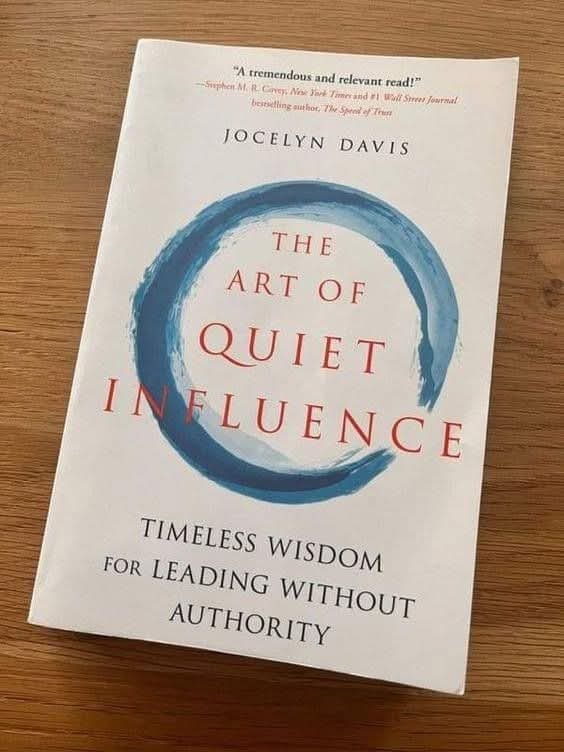This insightful book blends timeless wisdom from great thinkers and philosophies with practical strategies for influencing others without relying on positional power or authority.
Davis emphasizes the value of subtle, thoughtful, and ethical approaches to leadership and collaboration, making this book a great guide for anyone looking to lead effectively in today’s interconnected world. Below are 10 key lessons and insights from the book:
1. Influence Doesn’t Require Authority
One of the central ideas in the book is that you don’t need a formal title or position of power to influence others. True influence comes from your ability to inspire, connect with, and guide others through quiet strength, wisdom, and authenticity. Leadership is about relationships, not hierarchy.
2. Practice the Art of Listening
Davis highlights the importance of deep listening as a foundational skill for quiet influence. By truly listening to others without judgment or interruption, you create trust, demonstrate respect, and foster meaningful connections. Listening allows you to understand others’ perspectives and influence them more effectively
3. Embrace Humility and Authenticity
Quiet influencers don’t seek the spotlight or try to dominate conversations. Instead, they lead with humility and authenticity, which inspires trust and cooperation. Being genuine and honest about your intentions and actions creates a solid foundation for mutual respect
4.Draw on Timeless Wisdom
Davis incorporates teachings from various philosophical traditions, including Confucianism, Stoicism, and Buddhism, to illustrate how timeless wisdom can guide modern leadership. Principles like patience, self-awareness, and ethical behavior can help you navigate challenges and influence others in a thoughtful, grounded way
5. Focus on Building RelationshipsTrue influence is rooted in relationships, not transactions. Davis emphasizes that investing in meaningful connections with others—based on trust, empathy, and mutual respect—is key to leading without authority. When people feel valued and connected, they are more likely to align with your vision or goals
.6. Lead by ExampleQuiet influence is about modeling the behavior you want to see in others. Instead of commanding or persuading, demonstrate the values, attitudes, and work ethic you wish to inspire.
Actions speak louder than words, and people are more likely to follow your lead when they see you practicing what you preach.
7. Cultivate Emotional
intelligence is a crucial skill for quiet influencers. Davis emphasizes the importance of self-awareness, empathy, and emotional regulation in understanding and influencing others. By managing your emotions and tuning into the needs of others, you can navigate complex situations with grace and tact.
8. Focus on the Bigger Picture
Quiet influencers don’t get bogged down in petty conflicts or short-term wins. Instead, they focus on the greater purpose or shared vision that unites people. By reminding others of the bigger picture, you can inspire collaboration and alignment toward common goals.
9. Use Stories to Inspire
Storytelling is a powerful tool for influence. Davis explains that sharing meaningful stories, metaphors, or examples can resonate with people on a deeper level, making your message more relatable and impactful.
Stories help people see the “why” behind your ideas and connect emotionally to your vision.10. Don’t Underestimate the Power of Small ActionsQuiet influence is often built through small, consistent actions rather than grand gestures.
Davis encourages readers to focus on everyday opportunities to support, encourage, and guide others. Over time, these small acts of influence can create lasting change and inspire others to follow your lead.
In “The Art of Quiet Influence,” Jocelyn Davis redefines what it means to lead and influence in today’s world.
The book challenges the traditional notions of power and authority, instead offering a path for leadership that is rooted in authenticity, humility, and meaningful connection.
By drawing on timeless wisdom and practicing quiet, thoughtful actions, anyone can become an effective influencer, regardless of their position or title
.The key takeaway is this: true influence isn’t about commanding or controlling—it’s about listening, connecting, and inspiring others through your actions, values, and presence. By embracing the principles of quiet influence, you can lead with integrity and create a positive impact in any area of your life.
 Top Trends Blogs Trending Blogs – Latest News
Top Trends Blogs Trending Blogs – Latest News

